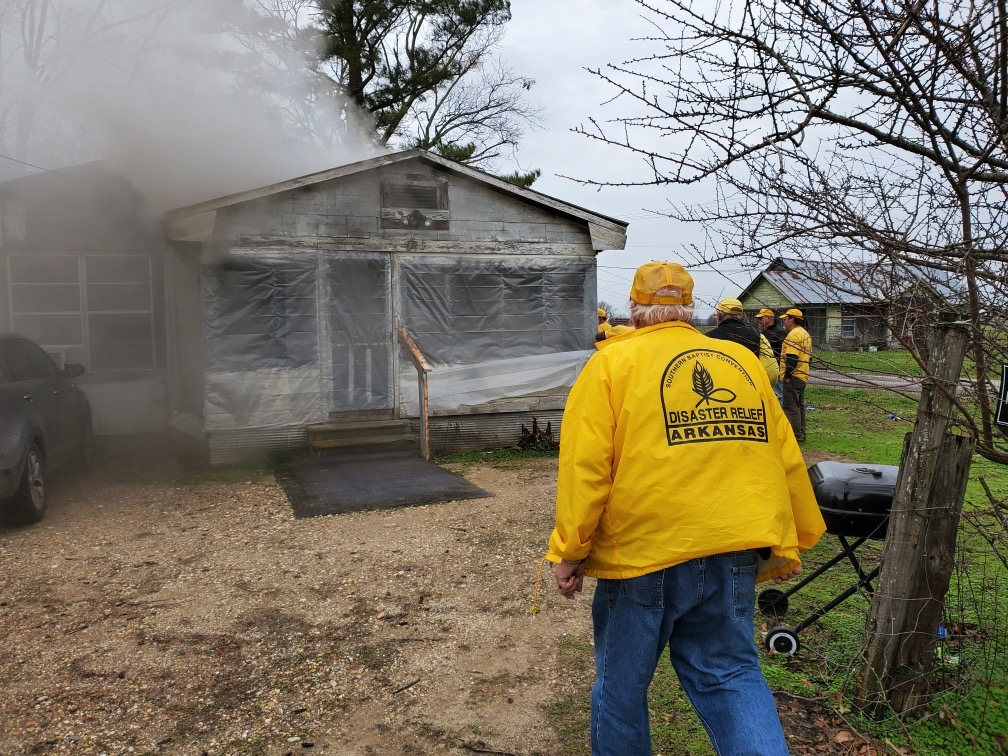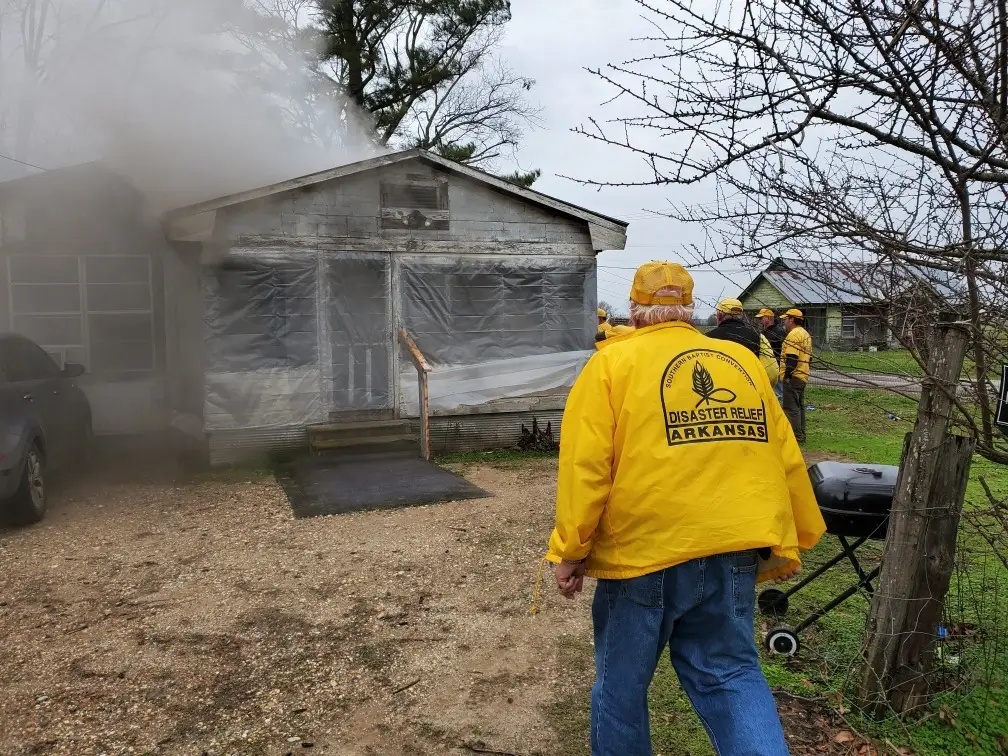
A disaster is defined as an occurrence that causes human suffering or creates human needs that the survivors cannot alleviate without assistance. Disasters have been a part of human history ever since the Great Flood. Disasters take many different forms, but the end result is destruction and devastation for those impacted.
These events that bring about so much pain and suffering, also provide unique opportunities for ministry. It is in the midst of these devastations that you will find a group of Arkansas Baptist men and women offering the help, healing and hope of Jesus Christ to those in need. Arkansas Baptist Disaster Relief teams have been ministering to people impacted by disasters for almost 40 years. The “yellow shirts” have become a stabilizing force of hope and comfort to disaster survivors across the state and around the country. Although the disasters haven’t changed much through the years, the role that Arkansas Baptist Disaster Relief plays has changed dramatically.
The beginning
Disaster relief work in Arkansas had its beginnings in 1981 as the Arkansas Baptist Men. With a limited budget, this team was able to purchase a used Greyhound bus. Ed Lauderdale, a volunteer from Quitman, led the team that remodeled the bus and turned it into a fully self-contained feeding unit, including sinks, ovens, counters, storage and sleeping space. A maximum of six men were required to run the unit.
The first deployment for the converted bus was to Marion, Illinois in 1982 to feed tornado survivors as well as emergency workers. The bus was used for over a decade as the team travelled all over the country to assist with disasters. Arkansas was one of the only state conventions with disaster relief capabilities at the time.
The next chapter
In the mid 90’s, the Greyhound bus became undriveable. State Disaster Relief leader Glendon Grober began searching for a replacement. Taking advantage of the newest technology of the time, known as the internet, Grober was able to locate a company in Indianapolis, Indiana. With a budget of only $2000, Grober drove up to the factory in search of the right trailer to build a new feeding unit. After a long search and intense negotiation, Grober was able to purchase the right trailer for $1700. The company added air ride suspension for an additional $500.
Grober enlisted the help of Bean Brothers Trucking in Amity, Arkansas to haul the trailer back to Arkansas. Ed Lauderdale and a number of other volunteers traveled at their own expense and spent many days each week working to customize the trailer to meet the needs of Disaster Relief. Upon completion of Unit 1, the Arkansas Baptist State Convention voted to change the name from Arkansas Baptist Men to the current Arkansas Baptist Disaster Relief (DR). The name change opened the door for women to be trained and serve as DR volunteers.
Hurricane Katrina
The completion of Unit 1 along with the name change opened the door for several association and church units to come online. These units consisted of mostly feeding units with a few chainsaw units as well. Even though new units were added for the next decade, it was not until 2005 when the Gulf Coast was rocked by Hurricane Katrina that Arkansas Baptist Disaster Relief really began to grow into the ministry that many are familiar with today.
During Katrina, chainsaw, flood recovery and feeding units were deployed to Gentilly and Kenner, Louisiana. This was the first time that flood recovery was used on such a large scale. Arkansas Disaster Relief teams served on a rotating basis for over six months. During this time, the feeding units served over 1,000,000 meals! People back home in Arkansas began to catch a larger vision for the ministry of ABSC Disaster Relief and more units were brought online as many people began to volunteer to serve.
The vision realized
In the years since Katrina, ABSC Disaster Relief has grown to a volunteer force of over 3,200. Since that time, Arkansas Baptists have become even more aware of the connection between the Dixie Jackson Arkansas Missions Offering and Disaster Relief. Thousands of dollars have been donated and thousands of volunteers have been trained and deployed to assist with various disasters. An emphasis has been given to the role of chaplaincy and personal evangelism among the DR team members.
The number of active units has grown from that one converted Greyhound bus in 1981 to over 50 different Disaster Relief units located around the state. In total there are now 13 feeding units throughout the state with the capacity to cook and serve over 105,000 meals a day. Unit 1 alone can now provide 30,000 meals a day. In addition, all feeding units have had manager serve safe training to help ensure the health and safety of volunteers and disaster survivors alike.
Initially Arkansas Disaster Relief ministries were limited to feeding, chainsaw and some flood recovery. Today, volunteers can choose to be credentialed in one or more of the following:
- Feeding
- Recovery – Chainsaw
- Recovery – Flood Recovery
- Shower/Laundry
- Communications
- Box Ministry
- Chaplaincy
- Incident Management
- Rebuild
In 2019 and 2020 Arkansas Baptist Disaster Relief saw 1,232 volunteers deployed for 218 days.
The teams served 22,864 meals, provided 501 chainsaw jobs and made 3,200 ministry/chaplaincy contacts. 504 Bibles were distributed with 351 Gospel presentations and 111 professions of faith. In 2019, Arkansas was second out of 42 conventions with 88 professions of faith for the year.
In addition to the “normal” relief efforts, Arkansas Baptist Disaster Relief also cooked and provided shower units for various mission events like One Day, CONNECT and World Changers. They were also involved in feeding first responders, providing meals for law enforcement during recent protests and providing generators to power the water station and hospitals in Helena-West Helena after recent winds tore through the area. ABSC Disaster Relief also helped to deliver over 183,000 meals around the state for local food banks during the Covid-19 pandemic.
Randy Garrett, Director of Arkansas Baptist Disaster Relief, says that they have become known across the state as the “go to people for any disaster in Arkansas.” He acknowledges that ABSC Disaster Relief would not be where they are today without the faithful volunteers who give their time and offerings to support the work of disaster relief. He also acknowledges the vision and work of those who helped pave the way, like Neal Guthrie, Ed Lauderdale, David Nobles, Billy Cox, Jim Sproles, Glendon Grober, Harry Black, Bill Cantrell and Joe Garner.
Because of your faithful giving and willingness to volunteer and serve, for the past 39 years Arkansas Baptist State Convention Disaster Relief has been extending the love of Christ to disaster survivors by preparing hot meals, removing damaging trees and debris, tarping roofs, shoveling mud, providing emergency communications, and coordinating the response through Incident Command leadership. Following a common ministry pattern of Jesus Christ, volunteers continue to seek to share God’s grace, hope, and Truth while meeting physical needs. Disaster Relief is a ministry of the heart – caring people rushing to people in crisis to offer the help, healing, and hope of Jesus Christ.

